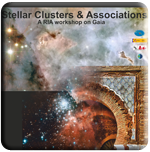The OTELO survey. A case study of [O III] λ4959,5007 emitters at ⟨z⟩ = 0.83
Bongiovanni, Ángel; Ramón-Pérez, Marina; Pérez María García, Ana; Cerviño, Miguel; Cepa, Jordi; Nadolny, Jakub; Pérez Martínez, Ricardo; Alfaro, Emilio J.; Castañeda, Héctor; Cedrés, Bernabé; de Diego, José A.; Ederoclite, Alessandro; Fernández-Lorenzo, Mirian; Gallego, Jesús; Jesús González, J.; González-Serrano, J. Ignacio; Lara-López, Maritza A.; Oteo Gómez, Iván; Padilla Torres, Carmen P.; Pintos-Castro, Irene Pović, Mirjana; Sánchez-Portal, Miguel; Jones, D. Heath; Bland-Hawthorn, Joss; Cabrera-Lavers, Antonio
Astronomy & Astrophysics, Volume 635, id.A35, 14 pp. (2020).
03/2020
ABSTRACT
Context. The OSIRIS Tunable Filter Emission Line Object (OTELO) survey is a very deep, blind exploration of a selected region of the Extended Groth Strip and is designed for finding emission-line sources (ELSs). The survey design, observations, data reduction, astrometry, and photometry, as well as the correlation with ancillary data used to obtain a final catalogue, including photo-z estimates and a preliminary selection of ELS, were described in a previous contribution.
Aims: Here, we aim to determine the main properties and luminosity function (LF) of the [O III] ELS sample of OTELO as a scientific demonstration of its capabilities, advantages, and complementarity with respect to other surveys.
Methods: The selection and analysis procedures of ELS candidates obtained using tunable filter pseudo-spectra are described. We performed simulations in the parameter space of the survey to obtain emission-line detection probabilities. Relevant characteristics of [O III] emitters and the LF ([O III]), including the main selection biases and uncertainties, are presented.
Results: From 541 preliminary emission-line source candidates selected around z = 0.8, a total of 184 sources were confirmed as [O III] emitters. Consistent with simulations, the minimum detectable line flux and equivalent width in this ELS sample are ∼5 × 10-19 erg s-1 cm2 and ∼6 Å, respectively. We are able to constrain the faint-end slope (α = -1.03 ± 0.08) of the observed LF ([O III]) at a mean redshift of z = 0.83. This LF reaches values that are approximately ten times lower than those from other surveys. The vast majority (84%) of the morphologically classified [O III] ELSs are disc-like sources, and 87% of this sample is comprised of galaxies with stellar masses of M⋆ < 1010 M☉.


